Project: Ukrainian Students Migration to Poland, the Czech Republic, Hungary, the Slovak Republic: human capital perspectives
Funded by International Visegrad Fund and The Kingdom of the Netherlands
Grant managing organisation: Institute of Public Affairs
Authors: Matyas Szabo
Concept of the project and methodology of the research: Yegor Stadny, Oleksandra Slobodian, Anastasia Fitisova, Mariia Kudelia
Review: Mariia Kudelia
Table of content
Immigration policies towards foreign students
Enhancement of human capital potential
Ukrainians students and graduates – numbers, profile, plans
Numbers and profile of Ukrainian students and graduates in Hungary
Motivation of Ukrainian students to study abroad
Readiness to take up employment in Hungary
Attachment 1 – Methodology note
Attachment 2 – In-depth interviews guides
Attachment 3 – Questionnaires for collecting statistics
Attachment 4 – Questionnaire for online surveys
Introduction
In recent years Hungary has developed state strategies and national policies in several major areas that relate to the focus of our research: there is a detailed National Youth Strategy for 2009-2024, adopted in 2009 by the Hungarian Parliament (resolution 88/2009. (X. 29.) OGY), a Migration Strategy for 2014-2020 accepted in 2013, and a national Labor Policy Strategy issued by the Ministry for National Economy for the period 2014-2020. However, none of these strategies contain provisions concerning employment of foreign students and they do not include any specific reference to Ukrainian citizens either.
Nevertheless, in broader terms, there are provisions and priority areas identified in national strategies that affect the immigration and integration of Ukrainian citizens (and in some cases also Ukrainian students) into the Hungarian society and labor market. For instance, supporting legal migration and visa facilitation are declared priorities of both the Migration Strategy and the seven-year strategy planning document, which is in line with the objectives of the European Commission’s Asylum, Migration and Integration Fund (AMIF). Indeed, the Hungarian strategy echoes the AMIF’s aims to support legal migration to EU States in line with the labor market needs and promote the effective integration of non-EU nationals. In addition, the objectives of the national strategy are to strengthen user-friendly public administration for the entry and residence of foreigners, to improve the integration of foreigners in Hungary. To quote the short summary available in English on the website of the Ministry of Interior: “(t)he strategy supports all forms of legal migration: through adequate legal instruments it provides for long-term residence, resettlement, acquisition of Hungarian nationality and it pays specific attention to the simplified naturalization procedure of people originally belonging to the Hungarian diaspora. In the context of visa policy it has been determined that Hungary has been a full member of the Schengen area since December 2007 and therefore it cannot independently order the issuing of visas. European Union rules allow quite limited opportunities for Member States to realize their migration objectives through visa policy. The document also mentions the “Opening to the East” policy, stating that “in case of countries in good economic condition (e.g. Turkey, the Gulf States, Russia, Azerbaijan, Kazakhstan) Hungary aims to simplify the entry procedure, supporting visa-free travel (..) in the belief that the number of businessmen, investors and tourists will grow.” Unfortunately, due to its least developed economy, Ukraine is not included in Hungary’s “Opening to the East” policy.
Policies
Selection of human capital
Major Policies in Higher Education
The Hungarian Government approved the Higher Education Strategy in December 2016 as part of its “Change of Pace in Higher Education” initiative and amended legislation accordingly to create a competitive and high quality higher education system. There are three key aspects of this strategy:
-
the knowledge passed onto the students should be relevant on the labor market;
-
research should be beneficial for society and the national economy;
-
institutions should act as regional catalysts.
Internationalization has also become an essential part of the development strategies of Hungarian higher education institutions. The aim of the government in 2016 was to raise the number of incoming international students from 25,000 to 40,000 by 2020. The most important reasons behind the strategy of internationalization of Hungarian higher education are economic and foreign policy ones. However, there could also be demographic reasons: increasing the number of foreign students in the country would compensate the drastic decrease in the number of Hungarian students. That number decreased from 400.000 in 2009 to 300.000 in 2017.
The government has commissioned the Tempus Public Foundation to help the process of internationalizing higher education, through two major funds. The first one, the Stipendium Hungaricum, is the most important and comprehensive scholarship scheme of the state, while the second one, the Campus Mundi program is a 9,2 billion forints (28.5 million EUR) fund available till 2021 to Hungarian higher education institutions to boost student mobility and to increase the international competitiveness and visibility of Hungarian universities. In neither of these two programs is there a specific country strategy or priority. There are, however, regional priorities: opening towards South and East (for foreign policy reasons). Hungary currently has some 32,000 foreign students, the two largest sending countries are Germany and China.
The Stipendium Hungaricum program is based on bilateral educational cooperation agreements signed between the Ministries (or other state bodies) responsible for education in the sending countries and Hungary or cooperation agreements signed directly between two institutions. Currently 60 sending partners are engaged in the program throughout 5 different continents and the geographical scope of the program is spreading each year. The number of Stipendium Hungaricum applicants is continuously increasing as well as the number of available scholarship places. For the 2017-2018 academic year more than 3800 scholarships were awarded, a number that will be increased in 2018-2019 to more than 5000.
Ukraine became a participating country of the Stipendium Hungaricum program in 2016. It is envisaged that approximately 100 scholarships will be offered to Ukrainian students until the end of 2018.
In Ukraine, the sending partner for the Stipendium Hungaricum Program is the Ministry of Education and Science of Ukraine. Ukrainian students can apply to all degree cycles in the following fields:
-
full degree bachelor studies: humanities and social sciences, technical sciences and medicine,
-
full degree master studies: humanities and social sciences, technical sciences and medicine,
-
full degree one-tier master studies: technical sciences and medicine,
-
full degree doctoral studies: in any field of interest.
Entering Hungarian Higher Education
International students can apply to a Hungarian university through two channels: they can either apply to the university directly through its own online application platform (ex: Corvinus University of Budapest or Eötvös Loránd University, Budapest ELTE ), or – in case they are foreign students of Hungarian ethnicity living in neighboring countries (especially relevant for Serbia and Ukraine, since all the other neighboring countries of Hungary are EU-member states) – they can apply through the Hungarian-language central application system, felvi.hu. Whichever platform the application happens through, a number of documents have to be submitted, such as a completed and certified application form, certificate of education, certificate or proof of citizenship (copy of passport/ID card, etc.), and proof of language proficiency in the language of study. It is the autonomy of faculties, schools, departments to define additional required documents to be submitted, such as essays, or different types of tests. Most universities also require an application fee (typically 100-150 EUR). Application documents written in languages other than English, French or German have to be translated to Hungarian or English. Depending on the program, students may have to take an entrance examination or attend an interview as part of their application procedure. This can either happen in person, at the given university or through Skype.
Citizens of neighboring countries who declare their Hungarian ethnic origin can get special treatment. The most important distinction compared to other international applicants is that these individuals can apply for state-funded university spots.
In some programs the tuition fee might vary depending on the degree level and whether the applicant is an EU citizen or not. Examples:
Table 1. The tuition fee in some programs of Hungary universities
|
University |
Program |
Fees |
|
Corvinus University of Budapest Faculty of Social Sciences and International Relations |
International Economy and Business MSc |
1750 EUR for EEA citizens 2450 EUR for non-EEA citizens per semester |
|
ELTE Faculty of Education and Psychology |
BA in Psychology |
4200 EUR per semester |
|
Budapest University of Technology and Economics Faculty of Architecture |
All BSc programs |
2250 EUR for EU-citizens 3200 EUR for non-EU citizens per semester |
The number of foreign students at a given university does not directly influence the state financing of the university. Universities in Hungary receive state funding according to the size of their student body, there is no differentiation among nationalities in this regard. It has to be noted however, that – with the number of Hungarian students enrolled in tertiary education decreasing faster than the size of their age group, attracting foreign students receives an increased attention. Funds and subsidies to improve university facilities, to promote their programs abroad, etc., can thus land at institutions with a good record of international mobility.
Scholarships available
The most important state scholarship schemes are the following:
Table 2. State scholarships for study in Hungary
|
Program |
Description |
Link |
Are Ukrainian citizens eligible? |
|
Study scholarship (in Hungarian: “tanulmányi ösztöndíj”) |
Study scholarships are given for a semester for state-funded, full-time students. The scholarship is awarded to those with excellent academic achievements (based on GPA). |
Only if they are of Hungarian ethnic origin and their training is funded by the state. |
|
|
Scholarship of the Republic (“köztársasági ösztöndíj”) |
Students with outstanding academic achievement (including GPA, research papers, etc.) are awarded the scholarship for one academic year – 10 months. Only those Bachelor’s and Master’s students or students of undivided programs who have completed at least 2 semesters and 55 credits are eligible to apply. 0.8% of the state-supported, full-time students are to receive the scholarship, but at least one student per institution. |
Only if they are of Hungarian ethnic origin and their training is funded by the state. |
|
|
Social support scholarship (“szociális ösztöndíj”) |
Students with disabilities, severe health problems, or in any other disadvantageous position are eligible. About 12 000 – 24 000 HUF/month. State-funded. |
Only if they are of Hungarian ethnic origin and their training is funded by the state. |
As mentioned before, since 2016 Ukrainian students studying in English-language programs offered by Hungarian universities are eligible to receive a Stipendium Hungarian grant. Students benefiting from the scholarship are to complete or do a part of their studies in Hungary in fields specified by the bilateral agreement signed between the relevant ministries in Hungary and Ukraine. The grant covers: tuition-fee, a monthly stipend of approximately EUR 130 for BA and MA studies and 450 EUR for PhD studies), contributions to the living expenses in Hungary, for 12 months a year, until the completion of studies, free dormitory place or a contribution to accommodation costs for the whole duration of the scholarship period, as well as medical insurance.
Immigration policies towards foreign students
According to the Hungarian Government’s Migration Strategy for 2014-2020, accepted in 2013, ‘knowledge-based migration’ is to be encouraged and promoted in Hungary – this includes both students and researchers. The strategy states that the presence of third-country students and researchers helps maximize the country’s potential, stimulates R+D, and strengthens the country’s international relations. It also aims to facilitate the integration of freshly-graduated international students into the labor force. An important element of this is, the document writes, their education of language and culture, plus job-finding programs. In addition, ‘Hungary is to be made more attractive for those who plan to carry out an investment or start an enterprise that is exceptionally important for the national economy (without necessarily settling down in Hungary). Although this is not primarily a matter of migration policy, visa-procedures and other administrative issues are to be made easier, more efficient for this group.
Legalizing student’s stay in Hungary
Foreign students accepted to Hungarian universities need to obtain a residence permit for the purpose of studies . The validity period of a residence permit issued for the purpose of study is usually one year, or it corresponds to the duration of training and may be extended by at least one or at most by two additional years at a time.
Concerning higher education, this residence permit is granted to third-country national:
-
who has been admitted to or accepted by a public education institution registered in the public education information system for pursuing full-time course of study in the regular school system or in daytime courses of study under a student relationship in Hungary; or
-
who is pursuing full-time education and training in a State-recognized institution of higher education or a foreign higher education institution authorized to operate in the territory of Hungary in daytime courses of study; and/or
-
who seeking residence in Hungary so as to attend a course in a higher education institution, which may cover a preparatory course prior to such education; and
-
who is able to verify the linguistic knowledge required for the pursuit of studies (Note: This does not necessarily have to be Hungarian but the language of study);
-
who is able to evidence that public education fees or the fees charged by the higher education institution have been paid;
-
who has a valid travel document;
-
who is in possession of the necessary permits for return or continued travel;
-
who is able to verify the purpose of his/her entry and residence;
-
who has sufficient means of subsistence and financial resources to cover his/her accommodation costs for the duration of the intended stay and for the return to his/her country of origin or transit to a third country;
-
who has comprehensive healthcare insurance or sufficient financial resources for healthcare services;
-
who is not subject to expulsion or exclusion, he/she is not considered to represent a threat affecting public policy, public security, national security, or public health of Hungary;
-
for whom an alert has not been issued in the SIS for the purposes of refusing entry and residence; and
-
who has notified the address of his/her accommodation in the territory of Hungary.
The pursuit of studies, as the purpose of stay, may be verified by a certificate of admission from the relevant educational institution or a document testifying student status.
Linguistic knowledge may be verified by a language certificate in proof of language proficiency examination, an official diploma in proof of studies in a foreign language, or other reliable means.
A third-country national is considered to have sufficient resources to cover his/her subsistence for residence for a stay exceeding ninety days within a one hundred and eighty day period if his/her lawful income or assets or his/her family member’s income or assets is sufficient to cover their living expenses, including accommodation, return travel, and if necessary, healthcare. The requirement of subsistence may, in particular, be verified by a certificate on the payment of scholarship grant or funds held on bank accounts. The third-country national’s residence in Hungary can also be financed by his/her family member, in which case authorities will verify family relationship, and request documentary evidence in proof of such family member’s ability to provide support.
The place of Hungarian accommodation must be a property shown in the real estate register as a residential building or detached house, or any similar property suitable for habitation (minimum 6 square meters of living space per person) or a commercial or other accommodation deemed appropriate by law. Compliance with the requirement of accommodation in Hungary may be proved by a residential lease contract in proof of the rental of a residence; a document on accommodation by courtesy; a document in proof of ownership of the residential property, in the form of abstract of title issued within 30 days to date; a valid letter of invitation with an official certificate affixed; documentary evidence that proves the reservation of accommodation and payment; a notarized statement made by a family member with the right of residence in Hungary as holding a long-term visa or residence permit, with immigrant or permanent resident status, holding a residence card or a permanent residence card in accordance with specific other legislation, or with refugee status, promising a place of abode to the applicant; or a real estate sales contract and a copy of the decision of the competent Budapest or county government agency granting permission for the acquisition of a real estate property.
Enclosed with the application for residence permit the applicant shall provide proof of having access to comprehensive health insurance services (in particular on the basis of specific other legislation on the social security system, international agreement, or under specific agreement), or that he/she has the necessary financial resources to cover the costs of such services.
The application for extension of the residence permit shall be submitted in person at the regional directorate responsible for the place where the accommodation is located, at least 30 days before it expires, with the necessary documents attached. Where the purpose of residence of a third-country national is study, the validity period of his/her travel document need to cover only the authorized duration of residence. In case of students, the request to extend the residence permit can be denied or the residence permit can be revoked by the immigration authority if the student is unable to obtain a graduation certificate within 1.5 times of what is defined as the study program’s duration.
Regarding access to health care, Hungary has a tax-funded universal state health care system. Patients who are holders of a valid, covered Hungarian Health Insurance Card (in Hungarian: “TAJ kártya”) are entitled to medical services free of charge at any medical facility contracted with the National Health Insurance Fund in the territory of Hungary. Students are eligible for such a card. Health insurance can be acquired either via: the National Health Insurance Fund of Hungary (Országos Egészségbiztosítási Pénztár – OEP). This is for a fee of 30% of the prevailing minimal wage monthly. Those having chosen this type of contract are eligible for health care, however, in the first 6 months of the contract this only applies to emergencies.
Alternatively, private suppliers also offer health insurance for typically a quarter of the price of the OEP schemes. Typically, universities offer new students a private insurance scheme at the time of enrollment.
A residence permit for the purpose of family reunification may be issued to a third-country national. Family members are defined as the spouse of a third-country national; the minor child (including adopted and foster children) of a third-country national with his/her spouse.
In addition to the same documents required when applying for a residence permit, the purpose of family reunification should also be proven. Family reunification, as the purpose of stay, may be verified by birth certificate; marriage certificate; adoption document; or any other document attesting the existence of family relationship.
There are no mandatory integration programs for migrants or foreign students at national level. Students, however can choose to attend a variety of optional programs that help them integrate in the life of universities, local communities and society at large. At most universities, first-year students start their studies with an Orientation Week which, in addition to formal necessities such as administration, includes social events, tours around campus, etc. For programs with international students, this typically includes sightseeing tours, lectures about Hungary, etc. (examples: Károli Gáspár University , Central European University )
The Erasmus Student Network, which is a Europe-wide network of student clubs has a mentor system in most universities that matches locals with international students (not only those in Hungary with Erasmus, but also full-degree foreign students). Mentors are supposed to help international students in a wide range of everyday tasks, from getting to know university services, finding a flat or room to rent. At Eötvös Loránd University of Budapest, for instance, there are mentors working at each faculty, so international students can turn to their mentors with faculty-specific questions as well.
Learning Hungarian language is not obligatory for foreign students. Hungarian language courses are offered by universities’ Language Centers alongside with other languages, with levels ranging from beginner to advanced. The courses typically last 12 weeks (a semester) and are for ECTS credits. (ex. Corvinus University of Budapest, University of Debrecen) numerous universities offer summer schools with intensive crash courses in Hungarian (ex.:University of Debrecen, ELTE) and also give insight on Hungarian culture (ex.: Summer University of Hungarian Language and Culture, organized by ELTE)
Enhancement of human capital potential
Transit to labor market
According to the Hungarian legislation foreign students studying in Hungary, as third-country citizens with residence permits for study purposes can pursue income earning activities in full-time for no more than 24 hours a week during a term and for no more than ninety days or sixty six working days a year outside the terms. After graduation if foreign students would like to stay in Hungary for work purpose they need to have Residence Permit for the Purpose of Employment.
Students holding a residence permit for the purpose of pursuing studies are not required to obtain a residence permit for the purpose of pursuing a gainful activity or employment during the time of study, and they do not need neither a work permit during the period of their studies.
Regarding taxes for student work, only student work organized through a student work agency comes with lower taxes. Students being employed outside of those schemes are to pay taxes irrespective or their student status.
After graduation, students will need a residence permit for the purpose of finding employment or starting a company. A residence permit for the purpose of job-searching or entrepreneurship may be issued to a third-country national:
-
who is in possession of a valid residence permit for the purpose of research and able to prove the completion of the research activity, or
-
who is in possession of a valid residence permit for the purpose of studies and able to prove the successful completion of studies,
-
the employment he/she is seeking or the business he/she is in the process of setting up corresponds to the level of research or of studies completed.
The application can commence 15 days prior to the student permit’s expiration. The permit is valid for a maximum duration of 9 months and cannot be renewed for the same purpose.
A residence permit may be issued for the purpose of employment to those third-country nationals whose purpose of residence is to perform work for or under the direction or supervision of others, for remuneration, under contract for employment relationship; or· who performs work as the owner or executive officer of a for-profit business association, co-operative society or some other legal entity. Eligibility criteria: residence, adequate means of subsistence, existence of Hungarian accommodation, comprehensive health insurance and conditions of exit.
The administrative time limit in proceedings opened for determining an application is 21 days. In single procedures the competent authority shall adopt a decision on applications for residence permit within 70 days from the date of submission. If the third-country national is employed by a preferred employer, the competent authority shall adopt a decision on the merits within 60 days from the date of submission of the application.
Work permits
There is no specification of preferred regions or economic sectors and the government’s Migration Strategy for 2014-2020 does not have any particular section on engaging Ukrainians specifically.
The Migration Strategy does note, however, that “Hungary feels responsibility for the Hungarians living outside its borders” and that “it is a priority for Hungary that the members of the Hungarian minority living in Ukraine and Serbia may enter the territory of motherland without a visa” (The European Parliament approved Ukraine’s visa waiver in April 2017, Ukrainians do not require a visa to enter into Hungary given that their stay lasts 90 days or less.)
Simplified regulations in access to labor markets also exist for Ukrainian and Serbian citizens, who do not need work permits for a list of jobs where there is labor shortage. In June 2017 the list of job positions for which Ukrainian and Serbian citizens do not need work permits in Hungary has been extended. The statement of the Ministry for National Economy published lately in the Official Bulletin lists already 41 permit-exempt job positions. The regulation covers, among others, qualified IT experts, engineers, programmers, drivers, skilled construction workers, sewing-women, carpenters and nurses. The possibility of obtaining employment-purpose residence permits (without the existence of a work-permit) is given for the job positions included in the list and exclusively for Ukrainian and Serbian citizens. Exceptionally, employment through temporary work agencies is also possible. The Immigration Office provides an 8 days’ accelerated judgment process for the employment purpose residence permit applications.There are two methods of submitting the employment purpose residence permit application:
-
The legal representative submits the application to the competent Immigration Office. In this case, a document duty of 180,000 HUF must be paid for each submitted application.
-
The Ukrainian employees submit their applications to the Hungarian consulates. In this case no duty is to be paid. With this method, the process takes longer, because consulates manage bulk requests very slowly.
Ukrainians who wish to work in Hungary in a position that is not listed in the 41 permit-exempt job positions, need to receive a work permit, similarly to other non-EU citizens. Normally, most of the necessary bureaucracy is handled by the employer (who is required to provide various documents to the immigration authorities, such as proof of qualifications and health certification). The application process itself takes up to 25 days and can be broken down into the following steps. Firstly, a workforce demand is required. The hiring company must advertise the job at the Hungarian Labor Office (Munkaügyi Központ) for a fixed period of 15 days. This is to give a chance for unemployed Hungarian citizens to apply for the position. Once fifteen days have passed, the employer can apply for the work permit on behalf of the employee. After being granted a work permit, the employee has to apply for the working visa in person at the Hungarian Consulate in his or her home country or in the country where he/she currently holds legal residence.
The work permit and the working visa are issued for two years. Both of these documents can be renewed if the employee wishes to extend his/her stay in Hungary and continues to fulfil the application requirements. Work permits issued in Hungary do not entitle its holder to work in other Schengen countries. Non-EU citizens will need to apply for a new work permit if they change their employer in Hungary.
Policies coherence
One of the major strategies in the country’s higher education development is internationalization, according to which the number of incoming should increase significantly. In order to reach its target of 40,000 foreign students by 2020, the government introduced the Study in Hungary program, and indeed signed a series of bilateral agreements with countries all over the world to receive a large number of students, partly to compensate also for the decreasing number of Hungarian students.
There is also a lack of qualified workforce with higher education degree, so besides internationalization, the transition to labor market is also made easier for foreign students. Hungary also wants to make its labor market more attractive for those who plan to carry out an investment or start an enterprise, particularly in areas that are exceptionally important for the national economy. A few months ago the government has introduced a new type of residence permit for those students/graduates who wish to search for a job or set up an enterprise in the country.
The government also feels responsibility for the Hungarians living outside its borders and since Ukraine does not allow its citizens to have double citizenship, the Hungarian government has introduced a series of favorable measures for those Hungarians abroad who live in neighboring non-EU countries (Ukraine and Serbia), such as: simplified regulations in access to labor markets and more importantly, access to state funded education.
Ukrainians students and graduates – numbers, profile, plans
Numbers and profile of Ukrainian students and graduates in Hungary
The total number of students studying at higher education institutions in Hungary shows a constant decrease in the past four years by more than 30 000, from 282 296 in the academic year 2013/2014 to 250 707 in 2016/2017. The table below shows the numbers and the changes in the major fields of studies. One can see that the most significant decrease occurred in social sciences and engineering, while a slight increases happened in education and sciences.
Table 3. Number of entrants to higher education institutions in Hungary (enrolled in Fall semester)
|
Field of education (ISCED nomenclature) |
2013/14 |
2014/15 |
2015/16 |
2016/17 |
Difference |
|
Education |
19880 |
21430 |
23778 |
26469 |
6589 |
|
Humanities and arts |
26345 |
25391 |
23650 |
21735 |
-4610 |
|
Social sciences, business and law |
96460 |
88340 |
81012 |
74919 |
-21541 |
|
Science |
20399 |
19187 |
17959 |
25218 |
4819 |
|
Engineering, manufacturing and construction |
52941 |
51373 |
49983 |
41264 |
-11677 |
|
Agriculture |
7506 |
7410 |
7318 |
9445 |
1939 |
|
Health and welfare |
30129 |
29493 |
29028 |
28478 |
-1651 |
|
Services |
23517 |
21711 |
19417 |
15560 |
-7957 |
|
Unspecified |
5119 |
7145 |
7384 |
7619 |
2500 |
|
Total |
282296 |
271480 |
259529 |
250707 |
-31589 |
Source: OH .
The number of foreign students studying at Hungarian universities, according to the enrolment figures of the 2017-2018 academic year is 30,276 persons, a figure that shows an increase of more than 2,000 students compared to the previous academic year. Within foreign students, Ukrainians represent 3,85%: there are 1168 students with Ukrainian citizenship currently studying at Hungarian universities, a figure that decreased from 1193 the year before.
In the 2017-2018 academic year more than 1000 Ukrainian students studied in Hungarian language programs, majority of them – 70% – studying in BA level programs (706), seven times more than in MA or integrated programs – see table below for more details.
The situation in case of Ukrainian students studying in English-language programs shows a very different picture: from the total of 158 students only twice as many study in BA programs (98) than in MA programs. From the total of 158 students studying in English-language programs 47 receive a Stipendium Hungaricum grant.
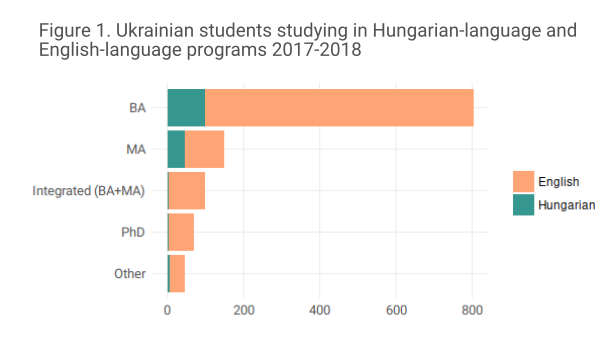
Source: OH .
In terms of universities with the largest number of Ukrainian students, Debrecen University leads the list with 303 students, followed by the Budapest ELTE University with 151. It is worth noting that out of the 5 top universities in the list (see below), 3 are regional universities situated close to the Ukrainian border, while only two are located in the capital or with campuses both in Budapest and its neighborhood.
Table 4. Universities with highest number of Ukrainian students studying in Hungarian-language programs (2017/2018)
|
Debrecen University |
303 |
|
ELTE, Budapest |
151 |
|
Szent István University |
74 |
|
Nyiregyháza University |
69 |
|
Reformed Theological Academy of Sárospatak (SRTA) |
48 |
Source: OH .
Again, the situation is totally different in case of those Ukrainian students who study in English-language programs: all five leading universities with the largest number of such students are located in Budapest.
Table 5. Universities with highest number of Ukrainian students studying in English-language programs (2017/2018)
|
Corvinus University, Budapest |
25 |
|
ELTE, Budapest |
25 |
|
International Business School (IBS) |
21 |
|
Budapest Metropolitan University (METU) |
15 |
|
Central European University |
14 |
Source: OH .
Motivation of Ukrainian students to study abroad
Based on the online anonymous survey filled in by 115 Ukrainian students currently studying in Hungary and 43 graduates, (of which 60 answered that they study or have studied in English, and 62 in Hungarian), a small majority of Ukrainian students have answered that one of the main reasons to study abroad are the unsatisfactory (or deteriorating) living conditions in Ukraine. Besides this “push factor”, the most frequently mentioned “pull factors” are the wish to gain knowledge that is useful for further employment in EU and receive a better education (see below all other reasons).
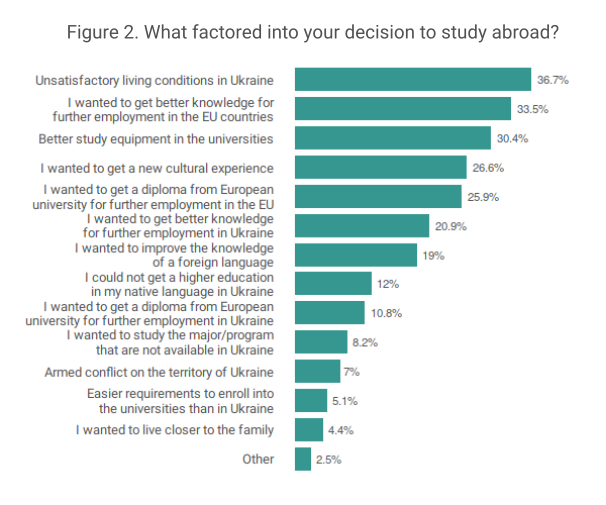
Source: Ukrainian Students Migration to Poland, the Czech Republic, Hungary, the Slovak Republic: human capital perspectives, 2018. N=158
Note: Respondents were asked to choose up to 3 answers from the given list.
Hungary seems to be a popular higher education destination for Ukrainian students primarily for offering the opportunity of free education. Indeed, as described earlier student of Hungarian ethnicity receive state scholarships, while one third of those who study in English-language programs receive a Stipendium Hungaricum grant. The quality of education, and the opportunity to study in their Hungarian native language also makes Hungary attractive.
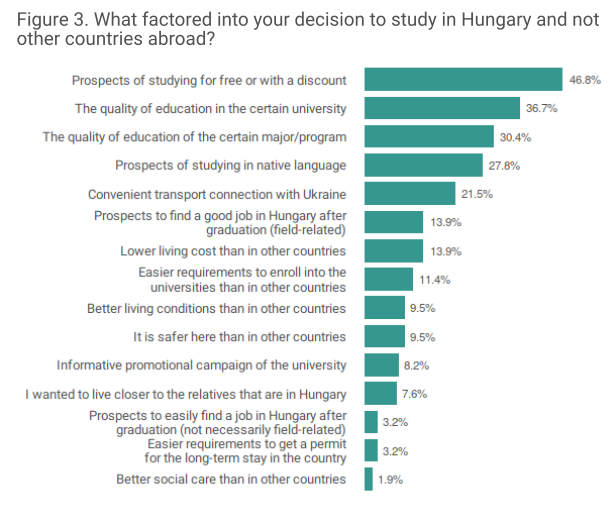
Source: Ukrainian Students Migration to Poland, the Czech Republic, Hungary, the Slovak Republic: human capital perspectives, 2018. N=158
Note: Respondents were asked to choose up to 3 answers from the given list.
When choosing a particular university, Ukrainian students seem to pay attention primarily to the status value of the higher education institution they intend to study in, followed by the availability of certain programs. Surprisingly, the convenient location of the university is not a priority for Ukrainian students, a finding that is somewhat contradicting the fact that most Ukrainian students who study in Hungarian language study at universities that are close to the border with Ukraine.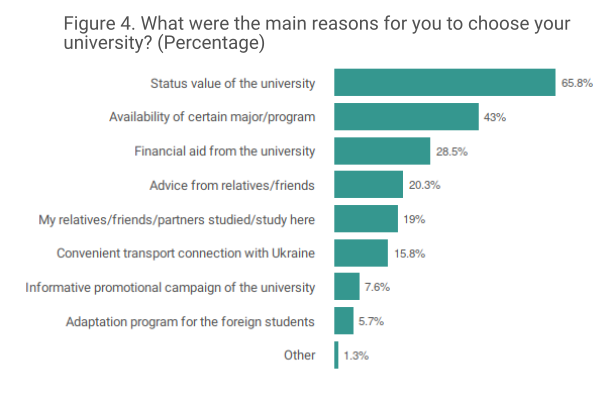
Source: Ukrainian Students Migration to Poland, the Czech Republic, Hungary, the Slovak Republic: human capital perspectives, 2018. N=158
Note: Respondents were asked to choose up to 3 answers from the given list.
Readiness to take up employment in Hungary
Labor Market Forecasts
The most recent and detailed labor market forecast is the one prepared by the ManPower Group for the 1st quarter of 2018. In this survey , employers were asked whether they wish to increase/decrease their staffing levels – and if yes, by what percentage compared to their current levels. The responses, broken down to sectors are the following:
-
Manufacturing: +27%
-
Transport, storage & communication: +23%
-
Construction: +19%
-
Agriculture, hunting, forestry and fishing: +8%
-
Electricity, gas & water supply: +5%
-
Public & social: +1%
As for regions of Hungary, the demand for more employees is the following:
-
Budapest: +22%
-
Southern Great Plain: +15%
-
Southern Transdanubia: +4%
-
Northern Great Plain: +6%
-
Northern Hungary: +12%
-
Central Transdanubia: +15%
-
Central Hungary: +17%
-
Western Transdanubia: +18%
These responses correspond also to data available through the Central Statistics Office, based on which the manufacturing sector and the retail and sale industry have the largest number of employees, and in both sectors the number is steadily increasing.
Labor market needs 2012-2016:
Table 6. Number of employees by sectors, 2012-2016 (thousands of people)
|
2012 |
2013 |
2014 |
2015 |
2016 |
|
|
Agriculture, hunting, forestry and fishing |
192,7 |
184,6 |
189,6 |
203,2 |
217,0 |
|
Mining and quarrying |
9,1 |
7,5 |
9,3 |
9,1 |
8,5 |
|
Manufacturing |
789,2 |
819,3 |
888,7 |
901,7 |
938,9 |
|
Electricity, gas, steam and air conditioning supply |
35,9 |
31,4 |
37,0 |
34,1 |
33,8 |
|
Water supply; sewerage, waste management and remediation activities |
63,4 |
61,4 |
55,9 |
56,5 |
60,0 |
|
Construction |
243,2 |
245,5 |
258,4 |
271,9 |
277,8 |
|
Wholesale and retail trade |
539,3 |
528,6 |
548,2 |
539,4 |
544,0 |
|
Transportation and storage |
258,5 |
259,5 |
258,8 |
268,6 |
277,1 |
|
Accommodation and food service activities |
161,8 |
158,0 |
168,1 |
183,3 |
192,8 |
|
Information and communication |
102,0 |
111,0 |
102,8 |
102,6 |
119,6 |
|
Financial and insurance activities |
91,6 |
96,1 |
95,2 |
87,4 |
95,0 |
|
Real estate activities |
23,1 |
20,6 |
20,2 |
18,8 |
21,7 |
|
Professional, scientific and technical activities |
131,1 |
148,8 |
151,6 |
156,9 |
151,6 |
|
Administrative and support service activities |
131,2 |
136,9 |
146,2 |
153,5 |
160,5 |
|
Public administration and defence; compulsory social security |
322,4 |
365,8 |
402,5 |
446,4 |
471,8 |
|
Education |
315,6 |
309,5 |
323,4 |
318,3 |
321,8 |
|
Human health and social work activities |
263,9 |
261,6 |
267,0 |
269,5 |
277,2 |
|
Arts, entertainment and recreation |
63,1 |
56,1 |
63,2 |
80,1 |
78,9 |
|
Other service activities |
90,1 |
90,6 |
99,0 |
102,5 |
100,1 |
|
Total |
3 827,2 |
3 892,8 |
4 100,8 |
4 210,5 |
4 351,6 |
Source: KSH
Unfortunately data on Ukrainians is not available.
Unemployment rates – based on date shown below, compiled by Eurostat – seem to be similar for Hungarian and foreign citizens for the 15-74 age group. Unfortunately there is no data for the 15-29 age group neither for Ukrainian citizens in particular:
Table 7. Unemployment rate in Hungary (%)
|
Citizenship |
Age |
2012 |
2013 |
2014 |
2015 |
2016 |
|
Foreign country nationals |
From 15 to 29 years |
n.a. |
n.a. |
n.a. |
n.a. |
n.a. |
|
From 15 to 74 years |
11,1 |
10,9 |
n.a. |
n.a. |
n.a. |
|
|
Hungarian nationals |
From 15 to 29 years |
19,5 |
17,8 |
13,9 |
12,1 |
9,1 |
|
From 15 to 74 years |
11 |
10,2 |
7,7 |
6,8 |
5,1 |
|
|
Total |
From 15 to 29 years |
19,4 |
17,7 |
13,9 |
12,1 |
9,1 |
|
From 15 to 74 years |
11 |
10,2 |
7,7 |
6,8 |
5,1 |
Source: Eurostat
Regarding the transition time from education to labor, based on the most recent results of the Hungarian Graduate Career Tracking System , it took 3.8 month on average for graduates to find a job after obtaining their diploma.
Looking at some of the most important fields in particular, the figures are as follows:
Table 8. Duration of job search by graduates of Hungarian universities (by specialties)
|
Social Sciences |
4.9 months |
|
Natural Sciences |
4.8 months |
|
Law |
4.07 months |
|
Economics |
3.8 months |
|
IT |
3.4 months |
|
Medicine |
1.9 months |
One can observe that after graduates of medical education those who studied IT would find a job in the shortest time, while graduates of social and natural sciences need to spend the longest time in getting employed. The same survey shows us that 79% of fresh or recent graduates worked in exactly their field of training in 2015. 60% of them were employed in jobs related to their field plus related fields, 19% of them in exactly their field. Those having left their field of study make up 21% of the surveyed population, 6% of whom were employed in jobs not requiring a diploma.
Leaving their field of study is typical among graduates of humanities (38.6%), but also quite common in the field of sports (33.5%) and social sciences (35.5%). Graduates of medicine, law, pedagogy, engineering and IT are most likely to find jobs within their field of expertise.
Similar data on foreign graduates is not available.
According to the most recent data by the National Employment Service (NFSZ), 6303 new work permits were issued in the year 2016 (20.2% more than the year before), and a majority of them to Serbian or Ukrainian citizens. 1413 Ukrainians got work permits in 2016, 268 more than in 2015. The new work permits were mostly issued for workers of the manufacturing sector, but tourism, agriculture and retail also played an important part.
According to Eurostat, there were 8400 employees among the 4.5 million economically active in Hungary in the third quarter of 2017 who were neither citizens of the country nor citizens of any other EU member state. There is no data however on what nationalities make up this part of the active population or in which sector they are.
Using the OECD indicator ‘Private net financial returns for a man or a woman attaining tertiary education (2013)’ from the OECD Publication ‘ Education at a Glance 2017 ’, the return on tertiary education as compared with the returns to upper secondary education is, on average, 381 800 USD for a man and 170 700 USD for a woman (converted using PPPs).
As for the social returns, there is a 90 600 USD net benefit difference in between the costs and the benefits of an individual attaining tertiary education (Using OECD’s ‘Public costs and benefits of education for a man or a woman attaining tertiary education (2013)’).
Ukrainian students plans after graduation
The answers given to the online survey indicate that majority of respondents intend to stay in Hungary (42 responses, that is 26.6% of respondents). Returning to Ukraine or moving to another EU country was chosen by only 24 and 20 respondents, respectively, representing only 15% and 12% percent of all respondents.
There is significant difference between the answers given based on the language of studies: from among those 53 students who study in Hungarian language 37 – that is 70% – said they would stay in Hungary, while only 5 – or less than 10% – would return to Ukraine. In case of students studying in English-language programs, the proportion is the opposite: 19 out of the total respondents of 61 (over 30%) would return to Ukraine, while a small minority of 4 (6%) would stay in Hungary.
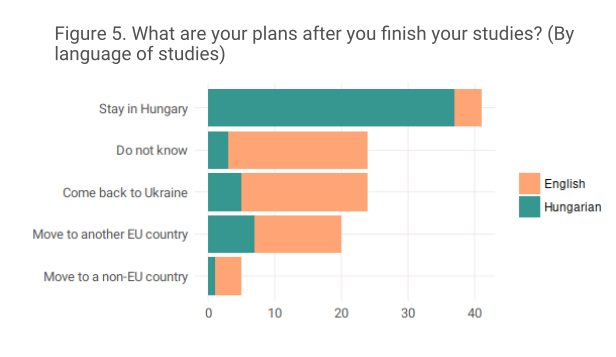
Source: Ukrainian Students Migration to Poland, the Czech Republic, Hungary, the Slovak Republic: human capital perspectives, 2018. N=114
Note: Only current students are included.
Although the number of answers spread across fields of study is relatively small, and therefore do not allow us to make reliable generalizations, one might see that the fields of study in which most likely students will stay in Hungary are IT, healthcare and welfare, and natural sciences. The only field in which a small majority of students would return to Ukraine is engineering, while the only field from which most students would move to another EU country is arts and humanities.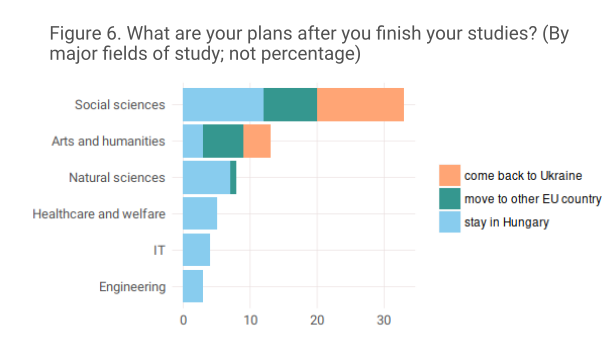
Source: Ukrainian Students Migration to Poland, the Czech Republic, Hungary, the Slovak Republic: human capital perspectives, 2018. N=66
Note: Only current students are included.
Having worked part-time during studies seem to have a major impact on plans after graduation: those who did not have work experience in Hungary during their studies are rather undecided about their future plans, while the large majority of those with working experience want to stay in Hungary. These figures, therefore, also show that the work experience Ukrainian students had in Hungary was positive, as twice as many want to stay in the country as those who intend return home.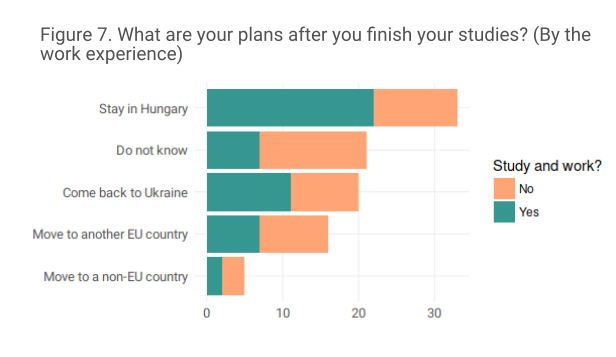
Source: Ukrainian Students Migration to Poland, the Czech Republic, Hungary, the Slovak Republic: human capital perspectives, 2018. N=95
Note: Only current students are included.
Ukrainian students’ overall satisfaction with their studies in Hungary is also rather high, but needs to be noted that those studying in English language programs are more satisfied than those studying in Hungarian-language programs.
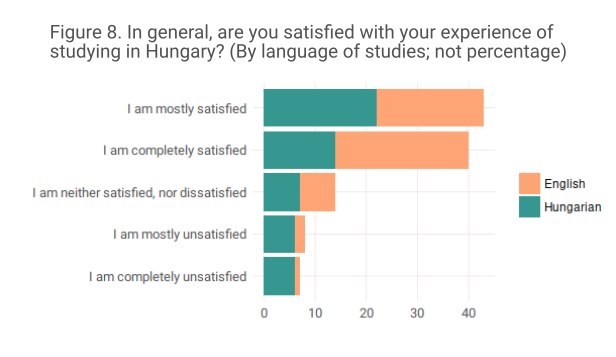
Source: Ukrainian Students Migration to Poland, the Czech Republic, Hungary, the Slovak Republic: human capital perspectives, 2018. N=112
When investigating the reasons for choosing either to stay in Hungary or return to Ukraine, a clear difference exists in the type of factors influencing such decisions: majority of Hungarian-language students intend to stay in Hungary, due to better living conditions, better job opportunities and higher salaries available in Hungary (these are the three main reasons, based on the chart below). These are all very utilitarian reasons all linked to standards of life and job market considerations. For their part, those studying in English-language programs choose to return back to Ukraine in order to use at home the knowledge their gained, live with their families and relatives and due to the cultural environment, emotional, cultural, family reasons that are rather different than in case of their Hungarian-language fellow students.
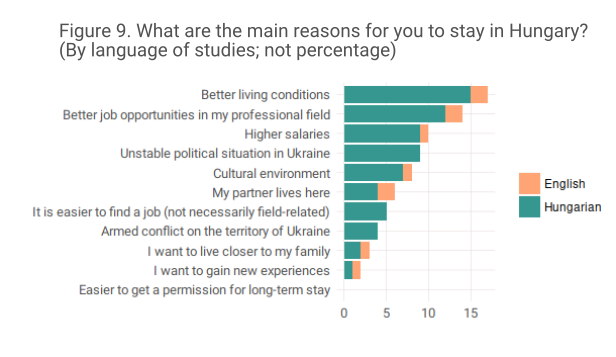
Source: Ukrainian Students Migration to Poland, the Czech Republic, Hungary, the Slovak Republic: human capital perspectives, 2018. N=41
Note: Respondents were asked to choose up to 3 answers from the given list.
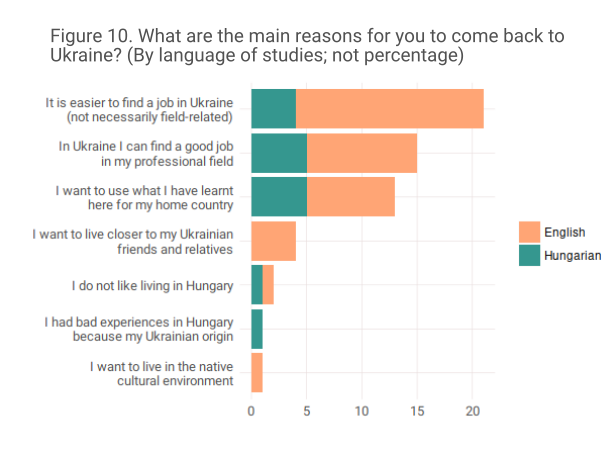
Source: Ukrainian Students Migration to Poland, the Czech Republic, Hungary, the Slovak Republic: human capital perspectives, 2018. N=24
Note: Respondents were asked to choose up to 3 answers from the given list.
In case Hungary wishes to attract more Ukrainian students, it should spread more information about study possibilities in Hungary, should offer more grants to prospective Ukrainian students, ad increase the number of available English-language programs:
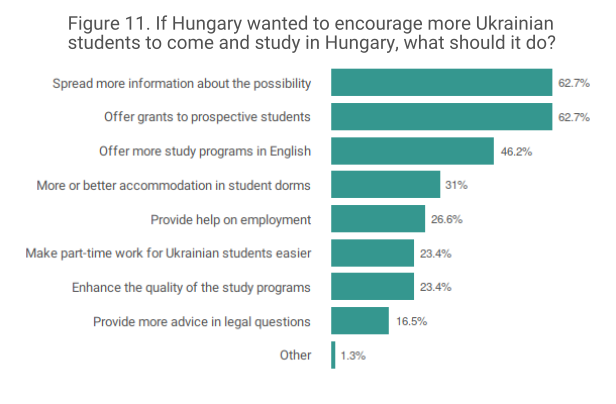
Source: Ukrainian Students Migration to Poland, the Czech Republic, Hungary, the Slovak Republic: human capital perspectives, 2018. N=158
Note: The choice of answers was not limited.
Data coherence
When discussing the situation of Ukrainian students in Hungary – and, in particular, their integration later on in the country’s labor market – it is important to note that, unlike in the other V4 countries examined in the frames of this project, Hungary has a significant number – around 150 000 – of ethnic Hungarians living outside its borders in Ukraine. During our study, therefore we needed to make a clear distinction between Ukrainian students and Ukrainian students with a Hungarian heritage. Since Ukraine does not allow double citizenship, the Hungarian government intends to help ethnic Hungarians in Ukraine through a variety of policy measures, including simplified regulations in access to labor markets and more importantly, access to state funded education.
The largest proportion of Ukrainian students studying in Hungary are those belonging to the Hungarian ethnic minority: of the total of 1168 students with Ukrainian citizenship in the 2017-2018 academic year more than 1000 studied in Hungarian language programs, majority of them – 70% – studying in BA level programs. Many of these students study in programs such as teacher’s training, nursery, Calvinist theology – subjects that in fact train qualified ethnic Hungarian students to return and work in Ukraine.
It is true in general that Hungarians living in neighboring countries have gained importance and growingly beneficial treatment in recent years, and this includes students. Them being eligible to apply to university through the central application system, and consequently compete for grants and stipends means that studying in Hungary for ethnic-Hungarian Ukrainians is – regarding red-tape and financial support – is not more difficult than for the country’s citizens.
The answers given by Ukrainian graduates who studied at Hungarian universities on where they lived after the graduation and currently, are consistent with students’ plans after graduation: majority of them either lived after graduation in Hungary (21) or returned to Ukraine (16), and it seems that their choice of country has not changed significantly afterwards (at present 17 of them live in Hungary and 20 in Ukraine).
Policy recommendations
Suggestions on what should Hungary do in order to attract more Ukrainian students also resonate with answers given by university representatives and other stakeholders during interviews. For many years, internationalizing higher education in Hungary only meant increasing the intake of Erasmus+ mobility students, who only spent one or two semesters at Hungarian universities. With the introduction of the Study in Hungary program and the Stipendium Hungaricum grant system, full study programs have been developed. Their number is constantly increasing, and stakeholders also believe that universities and public foundations need to increase their promotional activities in Ukraine, as the current number of Ukrainian students in Hungary is below the number of those who could enroll.
If improvements are to be made, they are thus in relation to Ukrainian students with no Hungarian heritage. This group, although geographically rather close to Hungary, seems to be at the periphery of the internationalization attempts of Hungarian higher education. There are, for example, more Iranian students in Hungarian tertiary education than Ukrainians. With Ukraine not being included in the ‘Opening to the East’ initiative, its students are given less attention. Although not having been able to clearly differentiate between students of Hungarian origin and Ukrainians of other ethnicities (a possible way to address this issue was our decision to distinguish between students studying in Hungarian-language and those in English-language programs), the fact that surveyed individuals claim Hungary should offer more grants and distribute more information testifies to this issue.
References
-
A 2014-2020 közötti időszak foglalkoztatáspolitikai célú fejlesztéseinek megalapozása (2014).
-
Act II of 2007 on the Entry and Stay of Third-Country Nationals.
-
Higher education. Study in Hungary: The Crossroads of Europe.
-
Legislation change. Specialist of Relocation Services, August 2017.
-
New Migration Strategy published. Website of the Hungarian Government, August 2013.
-
Residence Permit for the Purpose of Employment. Immigration and Asylum Office, April 2018
-
Residence Permit for the Purpose of Study. Immigration and Asylum Office, April 2018.
-
Sending Partners and Available Study Programmes. Study in Hungary: The Crossroads of Europe.
Support Cedos
During the war in Ukraine, we collect and analyse data on its impact on Ukrainian society, especially housing, education, social protection, and migration







